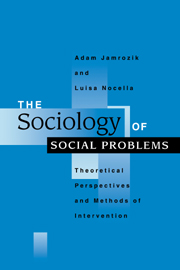Book contents
- Frontmatter
- Contents
- List of Tables
- List of Figures
- Preface and Acknowledgements
- 1 Introduction: Theoretical Perspectives on Social Problems
- 2 Contemporary Perspectives on Social Problems
- 3 Methods of Intervention in Social Problems
- 4 Social Actors in Social Problems
- 5 Challenges of Contemporary Social Problems
- 6 Social Problems in the Residualist Conversion Perspective
- 7 Inequality – The Underlying Universal Issue in Social Problems
- 8 The Social Construction of Family Problems
- 9 The Problem of Social Order
- 10 The Theory of Residualist Conversion: Does it Meet the Test?
- 11 Conclusions and Implications
- Bibliography
- Index
2 - Contemporary Perspectives on Social Problems
Published online by Cambridge University Press: 29 March 2011
- Frontmatter
- Contents
- List of Tables
- List of Figures
- Preface and Acknowledgements
- 1 Introduction: Theoretical Perspectives on Social Problems
- 2 Contemporary Perspectives on Social Problems
- 3 Methods of Intervention in Social Problems
- 4 Social Actors in Social Problems
- 5 Challenges of Contemporary Social Problems
- 6 Social Problems in the Residualist Conversion Perspective
- 7 Inequality – The Underlying Universal Issue in Social Problems
- 8 The Social Construction of Family Problems
- 9 The Problem of Social Order
- 10 The Theory of Residualist Conversion: Does it Meet the Test?
- 11 Conclusions and Implications
- Bibliography
- Index
Summary
There are numerous sociological perspectives on social problems. In addition to theories that entered the sociological discourse in the first half of the 20th century and that may be termed ‘classical’, such as social pathology, social disorganisation or social deviance theories, some newer perspectives have become influential in recent years. The conflict perspective and critical theory, which draw on the Marxian view of the capitalist society, became influential in the late 1960s and early 1970s, but have since been replaced by the constructionist perspective, which came to the fore with considerable impact in the 1970s and replaced the previously popular ‘labelling theory’ from which it originated. Since the early 1980s, a variety of perspectives have come into the field of sociology under the umbrella of feminism, poststructuralism and postmodernism. Now, in the later 1990s, the theoretical field of sociology is rather fluid – that is to say, there is much discussion and heated debate about the current nature of society, in which the ‘old’ tends to be rejected in no uncertain fashion while the ‘new’ might be argued for with great conviction and emotion but with much less clarity.
There is at least one distinctive difference between older and newer sociological theories, especially in the perspectives on contemporary social problems. Classical theories sought explanations for social problems either in the flaws of human personalities and characteristics (perceiving these flaws as a form of social deviance) or in social structure and social organisation (or rather disorganisation), or in both.
- Type
- Chapter
- Information
- The Sociology of Social ProblemsTheoretical Perspectives and Methods of Intervention, pp. 17 - 38Publisher: Cambridge University PressPrint publication year: 1998



